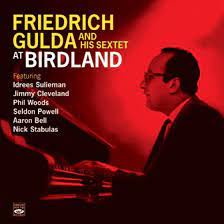
Daily Dose Of Jazz…
Friedrich Gulda was born on May 16, 1930 in Vienna, Austria and as the son of a teacher began learning to play the piano at age 7 with Felix Pazofsky at the Wiener Volkskonservatorium. In 1942, he entered the Vienna Music Academy, where he studied piano and musical theory under Bruno Seidlhofer and Joseph Marx.
During World War II as teenagers, Gulda and his friend Joe Zawinul were rebellious and would perform forbidden music, including jazz, in violation of the government’s prohibition of playing such music. Winning first prize at the Geneva International Music Competition in 1946, he began to play concerts worldwide, making his Carnegie Hall debut in 1950, and with Jörg Demus and Paul Badura-Skoda, formed what became known as the “Viennese troika”. Friedrich enjoyed a renowned classical career for years before his 1956 engagement at Birdland in New York City and at the Newport Jazz Festival.
In 1966 he organized the International Competition for Modern Jazz in 1966, and established the International Musikforum, a school in Ossiach, Austria two years later, for students who wanted to learn improvisation. From the 1950s on Gulda cultivated a professional interest in jazz, writing songs and free improvisation or open music improvisations. He also recorded as a vocalist under the pseudonym “Albert Golowin”, fooling music critics for years until it was realized that Gulda and Golowin were the same person.
In jazz, he found “the rhythmic drive, the risk, the absolute contrast to the pale, academic approach I had been taught. He also took up playing the baritone saxophone. His 1970 album, As You Like It, includes the standards Round Midnight and What Is This Thing Called Love?, as well as his own classic Blues For H.G. that is dedicated to Hans Georg Brunner-Schwer.
From the late 1960s through the 1980s he continued his straight-ahead swing and bop-based jazz often in European Jazz big bands, which he often organized yearly performances and recordings. He performed and recorded playing clavichord, percussion instruments, and a bass recorder wooden flute with musicians involved in free improvisation, including Cecil Taylor, Barre Phillips, Ursula Anders, John Surman, Albert Mangelsdorff, Stu Martin, and Fritz Pauer. He would go on to collaborate in the coming decades with Herbie Hancock, Joe Zawinul, and Chick Corea.
When the Vienna Music Academy awarded him its Beethoven Ring in recognition of his performances, he accepted it but then later reconsidered and returned it. To promote a concert in 1999, he announced his own death in a press release so that the concert at the Vienna Konzerthaus could serve as a resurrection party.
Pianist and composer Friedrich Gulda, who worked in both the classical and jazz fields, transitioned from heart failure at the age of 69 on January 27, 2000 at his home in Weissenbach, Austria.
More Posts: bandleader,composer,history,instrumental,jazz,music,piano,saxophone


